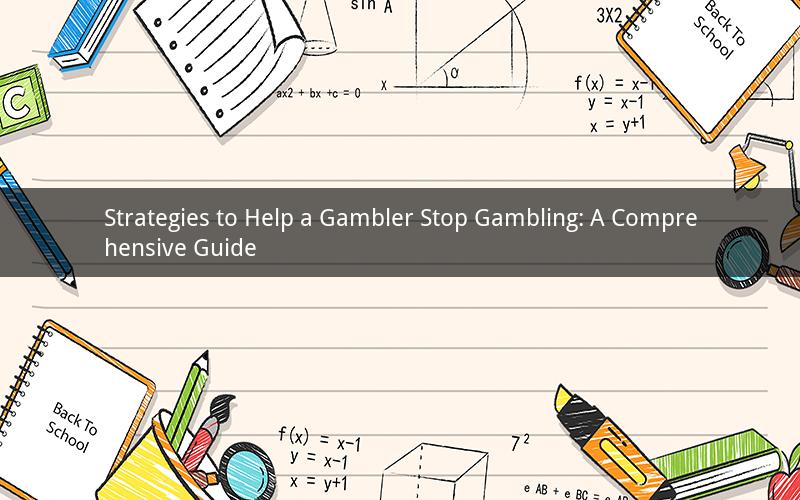
Introduction:
Gambling addiction is a serious issue that affects millions of people worldwide. It can lead to financial, emotional, and social problems. If you know someone who is struggling with gambling addiction, it's important to understand how to help them stop. This article provides a comprehensive guide on strategies to help a gambler stop gambling.
1. Understanding the Problem:
Before you can help a gambler stop gambling, it's crucial to understand the nature of the addiction. Gambling addiction is characterized by an inability to control gambling behavior, despite negative consequences. It's a chronic condition that requires professional help and support from loved ones.
2. Encourage Professional Help:
The first step in helping a gambler stop gambling is to encourage them to seek professional help. A therapist or counselor specializing in gambling addiction can provide personalized treatment and support. Therapy may include cognitive-behavioral therapy (CBT), which helps individuals identify and change negative thought patterns associated with gambling.
3. Create a Supportive Environment:
A supportive environment is essential for a gambler to overcome their addiction. Here are some ways to create a supportive environment:
a. Encourage open communication: Encourage the gambler to share their feelings and struggles without judgment. Listen actively and offer empathy.
b. Limit exposure to gambling: Help the gambler avoid places and situations that trigger their gambling urge. This may include blocking gambling websites or apps on their devices.
c. Encourage healthy activities: Encourage the gambler to engage in hobbies, exercise, and other activities that can provide a sense of fulfillment and distract them from gambling.
4. Financial Support:
Financial support is crucial in helping a gambler stop gambling. Here are some ways to provide financial support:
a. Help them create a budget: Assist the gambler in creating a budget to manage their finances and prioritize essential expenses.
b. Offer financial assistance: If necessary, offer financial assistance to help them cover debts or other financial obligations related to gambling.
c. Encourage them to seek financial counseling: A financial counselor can help the gambler develop strategies to manage their finances and overcome financial challenges.
5. Encourage Participation in Support Groups:
Support groups can provide a sense of community and understanding for individuals struggling with gambling addiction. Encourage the gambler to join a support group, such as Gamblers Anonymous, where they can share experiences and receive guidance from others who have overcome similar challenges.
6. Monitor Progress and Offer Encouragement:
Monitoring the gambler's progress is essential in helping them stay on track. Offer encouragement and celebrate milestones along the way. It's important to remember that recovery is a process, and setbacks are a normal part of the journey.
7. Educate Yourself:
Educate yourself about gambling addiction to better understand the challenges faced by the gambler. This knowledge can help you provide more effective support and guidance.
8. Set Boundaries:
Establish clear boundaries to protect yourself from the negative consequences of the gambler's addiction. This may include setting limits on financial support or spending time with them.
9. Seek Support for Yourself:
Caring for someone with a gambling addiction can be emotionally and physically taxing. Seek support for yourself by joining a support group for loved ones of gamblers or speaking with a therapist.
10. Be Patient and Persistent:
Recovery from gambling addiction is a long-term process. Be patient and persistent in your efforts to help the gambler overcome their addiction.
Frequently Asked Questions:
1. Q: How can I tell if someone has a gambling addiction?
A: Look for signs such as secretive behavior, financial problems, neglecting responsibilities, and preoccupation with gambling.
2. Q: Can a person overcome a gambling addiction on their own?
A: While some individuals may overcome their addiction with self-help strategies, seeking professional help and support from loved ones is often more effective.
3. Q: What are some common triggers for gambling addiction?
A: Triggers can include stress, boredom, social pressure, and past successes in gambling.
4. Q: How can I help a gambler who is in denial about their addiction?
A: Approach the topic with empathy and concern. Encourage them to seek professional help and offer support throughout the process.
5. Q: Can a person ever completely stop gambling if they have an addiction?
A: With proper treatment and support, many individuals can learn to manage their gambling behavior and lead a fulfilling life without engaging in harmful gambling activities.